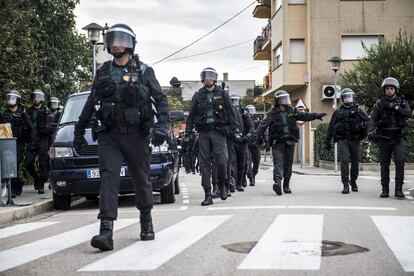Spain eyes sending 3,500 Civil Guard officers to Catalonia for election day
Internal memo suggests security deployment in region set to be increased ahead of the Catalan vote


The Spanish Interior Ministry is considering sending 3,500 Civil Guard officers to beef up security ahead of the Catalan regional elections on December 21, according to an internal memo which EL PAÌS has had access to.
The association of Civil Guard officers has described the measure as a “unilateral imposition”
The document, dated Monday at midday, also outlines the ministry’s plans to cancel any leave days or holidays between December 19 and 22 for officers participating in Operation Copernicus – the codename for the operation against the Catalan secessionist challenge. The memo lists the need “to be able to rely on the maximum possible presence of security personnel in Catalonia in the event of any extraordinary circumstances.”
According to the document, during this four-day period, officers permanently stationed in Catalonia, as well as those who have arrived in the region from other parts of Spain to take part in Operation Copernicus, will not be able to go on leave except in cases where it is considered “absolutely indispensable and duly justified.” The main association of Civil Guard officers (AUGC) has protested the measure, arguing it is a “unilateral imposition” that “disrespects” the officers.
Not only does the order revoke holidays, it also asks the heads of different commands to detail “the number of officers available for deployment as part of the security arrangements” for the regional election on December 21.
On November 2, days after Spanish Prime Minister Mariano Rajoy activated Article 155 of the Constitution and called early regional elections, the number of officers in Catalonia was around 3,496. Of those, almost half – 1,683 – came from Barcelona province, followed by Tarragona (609), Girona (517) and Lleida (457). The remaining 230 police officers came from the Barcelona city headquarters. The document demands these figures be updated as soon as possible.
The order comes weeks after the Interior Ministry decided to downsize the security operation in Catalonia, which had been deployed from mid-September to contain the illegal secessionist push. But given the relative calm following the activation of Article 155, a constitutional provision allowing the central government to take direct control of a region’s affairs, the 6,000-strong National Police and Civil Guard force in Catalonia had been halved by the end of November.
By the end of November, 15 anti-riot units had returned to their bases
High-ranking ministry sources previously told EL PAÍS that the plan is to keep the remaining 3,000 officers in Catalonia until after the regional election. This contingent will provide backup for the 2,929 police officers and 3,164 Civil Guards who are stationed permanently in Catalonia.
According to the team at the Interior Ministry, with law and order now in the hands of the Catalan police force Mossos d’Esquadra – which now answers directly to central authorities as part of the application of Article 155 –, national police and Civil Guard officers have been focused solely on protecting state buildings and critical infrastructure in Catalonia, and investigating the illegal independence referendum that was held on October 1.
The security downsize has been especially significant in the numbers of police intervention units, known colloquially as riot police. At the height of the crisis, the Interior Ministry deployed 44 of these units – two with a permanent base in Barcelona – to take part in Operation Copernicus. This represented two-thirds of Spain's 2,700 riot police officers. By the end of November, 15 of these units had returned to their bases.
English version by Melissa Kitson.
Tu suscripción se está usando en otro dispositivo
¿Quieres añadir otro usuario a tu suscripción?
Si continúas leyendo en este dispositivo, no se podrá leer en el otro.
FlechaTu suscripción se está usando en otro dispositivo y solo puedes acceder a EL PAÍS desde un dispositivo a la vez.
Si quieres compartir tu cuenta, cambia tu suscripción a la modalidad Premium, así podrás añadir otro usuario. Cada uno accederá con su propia cuenta de email, lo que os permitirá personalizar vuestra experiencia en EL PAÍS.
¿Tienes una suscripción de empresa? Accede aquí para contratar más cuentas.
En el caso de no saber quién está usando tu cuenta, te recomendamos cambiar tu contraseña aquí.
Si decides continuar compartiendo tu cuenta, este mensaje se mostrará en tu dispositivo y en el de la otra persona que está usando tu cuenta de forma indefinida, afectando a tu experiencia de lectura. Puedes consultar aquí los términos y condiciones de la suscripción digital.








































